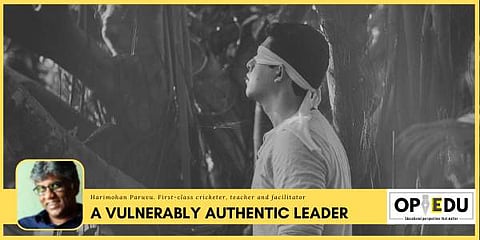

‘I’m amazed at how easily Sujith connects with people,’ said Rinku. ‘I wish I could connect to people like that. It’s a great quality for a leader to possess.’
‘Absolutely,’ said Rahul. ‘Some people connect easily while some struggle. Wonder what the trick is.’
‘You should watch this TED talk by Brené Brown on The Power of Vulnerability,’ said Rakesh. ‘It throws up some interesting perspectives.’
‘Vulnerability?’ asked Rahul. ‘That’s the farthest thing from leadership, isn’t it? Vulnerable people are like cry babies, no? People don’t like cry babies, bhaiyya.’
‘According to Brene Brown, people who make connections easily have certain characteristics that those who experience disconnection do not,’ smiled Rakesh.
‘What are those, bhaiyya?’ asked Rinku. ‘Don’t tell me vulnerability is one.’
‘Let’s look at those who feel a disconnection first,’ said Rakesh. ‘She says those who experience fear of disconnection come from a space of shame. They feel they’re not worthy of connection, not good enough to be seen as they are. Naturally, they struggle to make connections.’
‘Oh,’ said Rahul. ‘Does that mean that we’re not feeling good enough about ourselves and that’s why we are not able to connect as well as Sujith? But we’re quite confident and self-assured, no bhaiyya?
‘Yes,’ smiled Rakesh. ‘But obviously, you need more than that to connect. And sometimes Rahul, our confidence and self-assurance can put people off.’
‘Oh and those who make connections, bhaiyya?’ asked Rinku. ‘What’s their mindset?’
‘Those who make connections easily have a sense of worthiness, a sense of love and belonging,’ said Rakesh. ‘As simple as that.’
‘So, the next question is obviously this,’ said Rinku. ‘How can we improve our sense of worthiness so that we connect easily to others?”
‘Ms Brown has identified four qualities,’ said Rakesh. ‘They are — courage, compassion, authenticity and vulnerability.’
‘Courage?’ asked Rahul. ‘As in brave? Out there? Lead from the front? Larger than life? Confident?’
‘No,’ smiled Rakesh. ‘Courage as in simply being okay with who you are, warts and all. The courage to be imperfect. When you’re good enough for yourself, you become a wholehearted person. You feel worthy. You’re someone others find easy to connect to, because you are human.’
‘Oh,’ said Rahul. ‘And how do we use compassion to connect better to the team?’
‘Genuine compassion comes from those who are first compassionate to themselves,’ said Rakesh. ‘When you are compassionate with yourself, you can be genuinely compassionate with others. You reach out to others at an energy level, making it easy for them to trust you, and consequently, connect.’
‘And authenticity, bhaiyya?’ asked Rinku. ‘We all are authentic aren’t we?’
‘We are, to a large extent,’ said Rakesh. ‘But we all hide some parts of ourselves which we are not sure of. Authentic people are what they really ‘are’ and not what they ‘should be’. They are not playing a role. Others can feel the gap when we are not fully ‘there’. Just as they sense the openness to connect when we are who we are.’
‘I know,’ said Rahul. ‘I show only my best side and hide certain aspects from others.’
‘I get courage, compassion and authenticity,’ said Rinku. ‘But how can being vulnerable help in making connections. Like Rahul said, aren’t they like cry babies?”
‘No Rinku,’ said Rakesh. ‘Being vulnerable is the highest form of being yourself, of being seen as you are without feeling shame or inhibition. Without that feeling of ‘not being good enough’. You are vulnerable when you are yourself despite knowing you could be rejected and hurt. Wholehearted people embrace vulnerability, despite feeling unsure. They believe vulnerability is what makes them beautiful and human. Look at the people around you, stories you hear, movies you see — you realise that it’s to those who are willing to be vulnerable that you feel connected to, that you want to help. And vulnerability is not being a cry baby. It just means you are enough as you are — crying or otherwise.’
‘Hmm,’ said Rahul. ‘But bhaiyya, this is very different from my understanding of leaders? Does it work to be so vulnerable?’
‘It works not just for leaders but for everyone who wants to feel connected,’ said Rakesh. ‘Being vulnerable is being secure with your imperfections and trying your best. It’s honest. It creates a safe environment for everyone because people don’t feel threatened. We think of our leaders as perfect pillars, smooth and strong. But we cannot make a genuine connection when there is no crack to hold on to. If we try, we simply slip and slide off. Such leaders are inaccessible. But if the leader is vulnerable and shows a crack, an imperfection, it gives us an opportunity to hold on, to connect. To help.’
‘Hmm, makes sense,’ said Rahul. ‘Any other advantages apart from making connections?’
‘It’s the easiest way to live,’ said Rakesh. ‘When you’re vulnerable you love without guarantee, can be who you are without holding back. Being vulnerable is being fully alive because you let your walls down and allow life in. You trust life. And by simply believing you are ‘enough’ as you are, you listen empathetically and are kinder and gentler — qualities any human can be proud of. Be vulnerable and watch how it works wonders.’
‘Thanks, bhaiyya,’ smiled Rinku.
Pro Tip: To make genuine, wholehearted connections with others, be seen as you are. To be seen as you are, have the courage to accept your imperfections, be compassionate to yourself first and then others, be authentic as you are and most importantly, be vulnerable, which allows others to connect to you.
